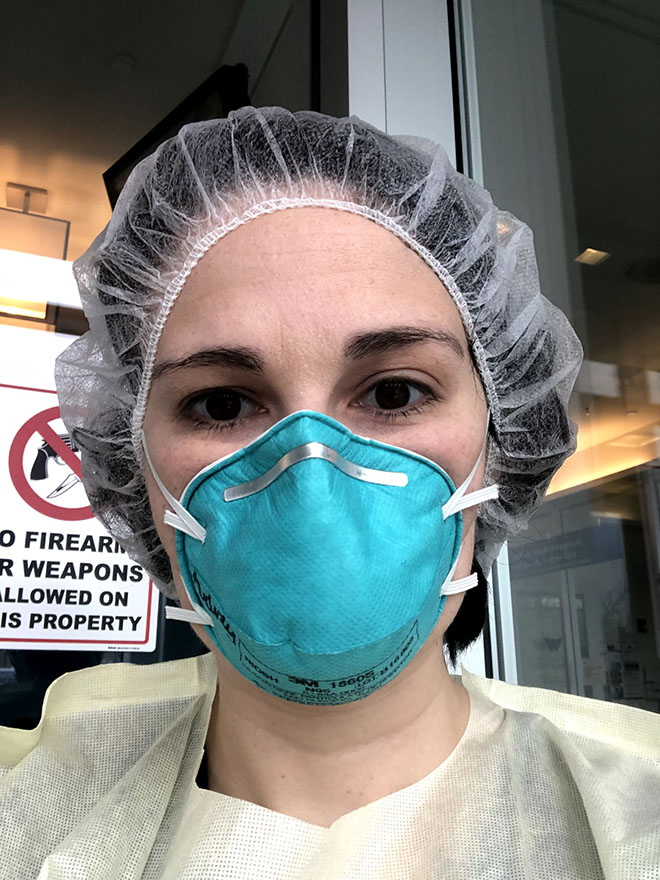
Boston is among the hardest-hit U.S. cities in the COVID-19 pandemic—and as recent reports show, low-income, minority communities are disproportionately affected. Audrey Etlinger Cohen '07, MPP’10, who earned a nursing degree a few years after completing her MPP at the Heller School, is uniquely positioned to help some of the city’s most vulnerable residents. As a high-risk nurse case manager at the Whittier Street Health Center, she’s helping Dorchester and Roxbury residents diagnosed with COVID-19 navigate the complicated health care system and access critical community supports.
What is a nurse case manager, and how has your role changed during the COVID-18 pandemic?
I work with our highest-risk individuals: folks with multiple chronic health conditions and social challenges such as substance use disorder or homelessness. I act as a single point of contact with health care providers. I help patients set goals, navigate multiple providers, and connect them to resources in the community. I use my MPP every single day to help patients set goals that benefit themselves and the healthcare system as a whole, such as reducing readmission to hospitals, reducing Emergency Department usage, and keeping patients in the community instead of nursing homes.
Now, during the COVID-19 crisis, I’m focusing on post-hospitalization education and connecting people with community resources to make sure they have what they need to self-quarantine. I’m following up with all of our patients who visited the emergency room, identifying our patients who have been infected, and contacting them to make sure they received and understand their results. Our patients may change phone numbers frequently, so if the hospital test shows they’re positive but they can’t reach the individual, they would never find out. Or, we have folks who know they are COVID positive, but didn’t understand their discharge instructions and aren’t self-quarantining. I’m taking the community supports I was using for folks with chronic illnesses and applying it here. I’m also helping to enroll patients in meal delivery services, and our pharmacy has started delivering medicines so patients can stay home while they recover.
Are you working in-person at the community health center or from home?
I’m at the clinic every day. I am able to do most of my work by phone, but all of our nurses are standing at the front door at least one day per week to screen everyone who goes into the building. A lot of folks come to the clinic when they don’t know where else to go, so they’re showing up even with positive COVID tests and severe symptoms. For example, I recently saw a man who was COVID-positive but was feeling better after two days, so he came to pick up his blood pressure medication. He didn’t understand why he needed to stay at home.
News reports are showing that COVID-19 is disproportionately affecting black and Latino populations, such as the communities you serve in Dorchester and Roxbury. How are you seeing that manifest with your patients?
It’s affecting this community more because of the sick person’s ability to respond to a COVID-19 diagnosis. Many of our patients are unable to work remotely, have no paid sick leave, and have bosses who offer little flexibility. I’m doing a lot of outreach to employers right now to ensure that employees get access to time to self-quarantine and slow the spread. As a health care provider, I can be a powerful advocate to employers. Additionally, many patients in this community don’t have enough groceries or supplies at home on a regular basis, much less the ability to stockpile two weeks’ worth. Housing presents a significant issue as well, as many patients often living in apartments with many other people. If someone gets COVID, the recommendation is to put them in a separate bedroom and bathroom. But if you have six people living in two bedrooms, how are you going to self-quarantine? It’s much more difficult to control the spread of infection in these types of living arrangements.
What do you want the Heller community to know about this crisis?
The skills you learned at Heller will be crucial to repairing and rebuilding once this is all over. Once we emerge from this, we as a society will have to take a hard look at our existing social systems and face the fact that massive structural issues—lack of paid sick time, reliance on employer-sponsored health insurance, wage inequality—contributed to this pandemic and to these disparities. We’ll need leaders who understand the history of these systems and the analysis skills to propose meaningful alternatives, and that’s you.
As someone who’s often working directly with patients who have COVID-19, how are you coping during this time?
I’m taking it one day at a time. Who knows what we’ll be facing two months from now? We just have to roll up our sleeves and tackle the challenges as they come. I’m grateful to have the opportunity to put my skills to use.
